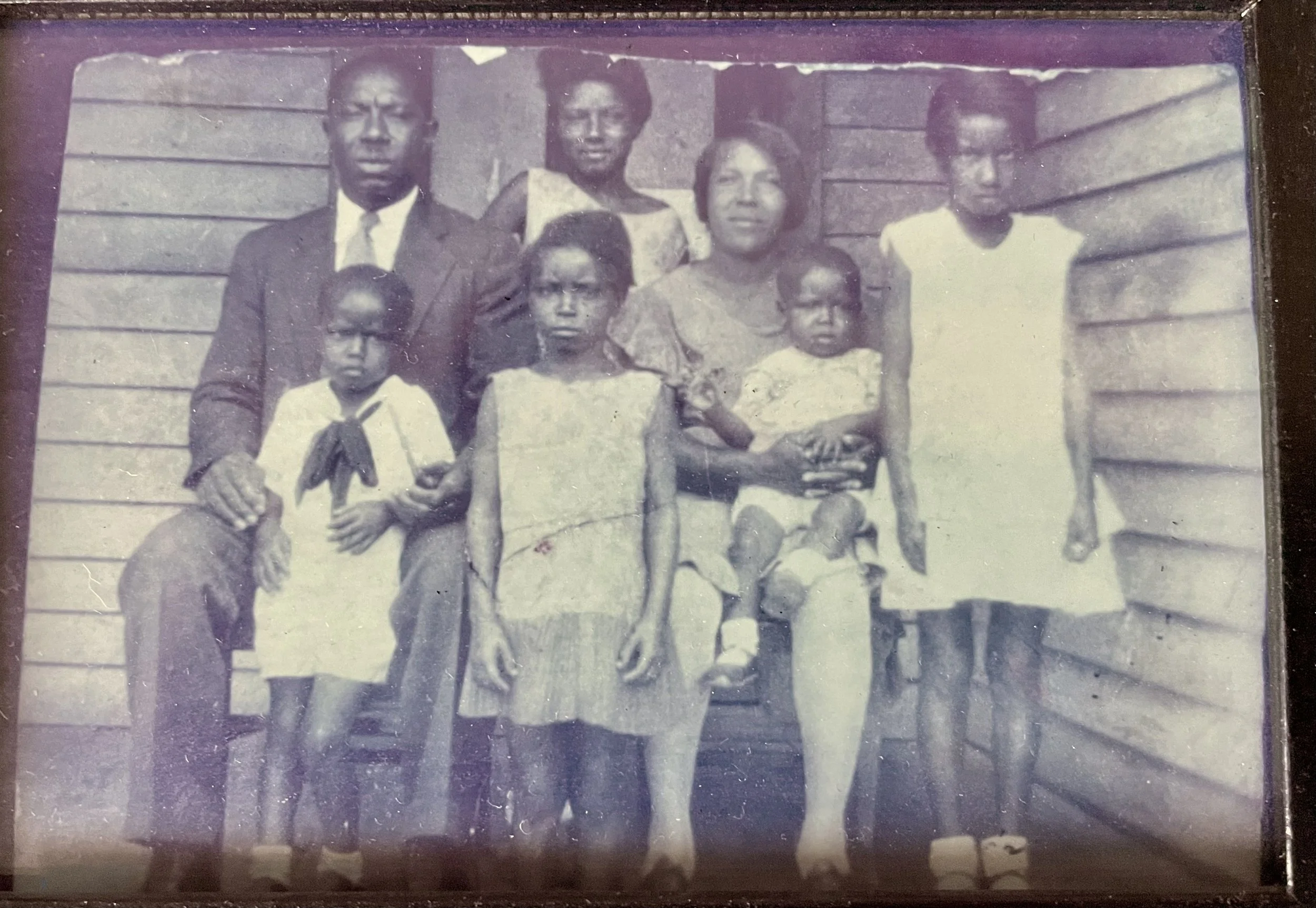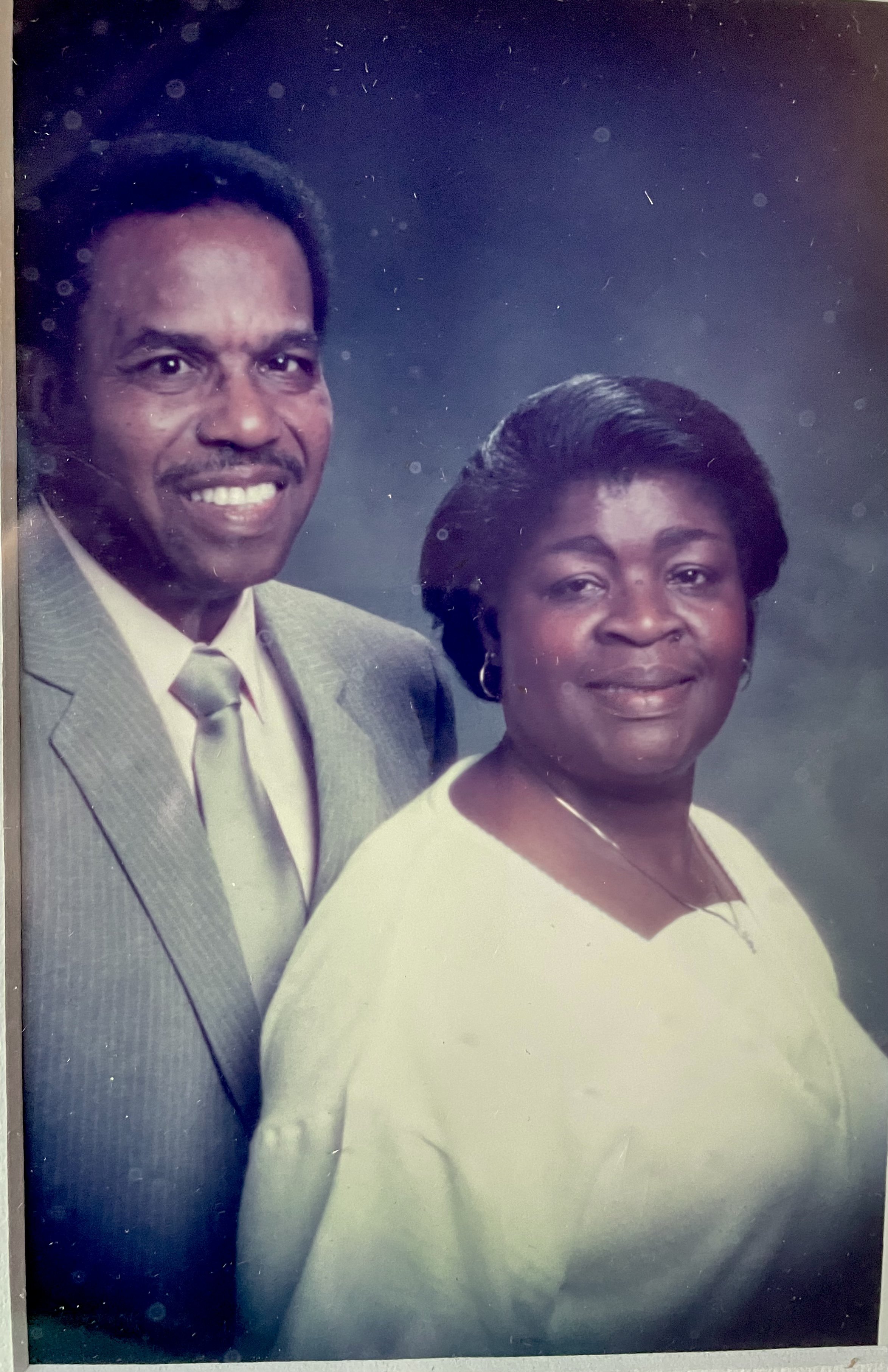Julia’s grandfather, Eddie Reed Jr, sitting on left with his father, Eddie Reed, Sr. Also pictured, her great aunts Maddie, Lizzie, and Alberta, great-uncle Willie (baby), and great grandmother Viola, at their home in Alabama
February is Black History month, a time to remember the Black artists, inventors, entrepreneurs, political figures, and activists who have shaped American history. But for Black people like me, it’s also a time to reflect on the stories of our own families, to acknowledge and honor their striving to create lives of dignity, purpose, safety, and joy. Before Black history month wraps up, I wanted to share a little bit of my own story with you.
My father’s family has deep roots in the South, first as enslaved people, then as free men and women, mostly working as sharecroppers and small farmers in rural Alabama. After World War II, my grandparents joined the Great Migration, settling in Dayton, Ohio in search of better opportunities for their children.
My grandpa was Eddie Reed, Jr, a southern gentleman who always called me "Peaches,” who came from a large, tightly knit family. In the early 1940s, He left his home in Alabama, lying about his age in order to join the segregated US Navy at 15. He served in the Pacific and in Alaska during World War II, and later became a postmaster in the U.S. Postal Service.
My dad, also named Eddie Reed, shares a legacy of service with his father. My dad is also a Navy veteran who had a public service career, working for decades in Seattle Public Schools. I love meeting former students in the Seattle area who know and were shaped by dad’s work.
Both my dad and grandpa took pride in serving something greater than themselves, and they always encouraged me to serve where I could. But even as they celebrated their service, they were clear-eyed, and sometimes deeply frustrated about the way the systems and institutions where they worked failed to live up to the ideals they promised, especially when it came to meeting the needs of Black communities.
I think my grandpa would be proud to see me running for the state legislature – and I know my dad is – because it’s an opportunity to address the systemic problems that have kept generations in poverty. Systemic choices that have limited access to education, healthcare, and housing, to justice and the ballot. Breaking those cycles is the work I hope to do if I’m elected to the legislature.
Julia’s grandparents, Eddie Reed, Jr. and Lillle Pearl Reed
Julia’s dad, Eddie Reed III, in his navy uniform
My grandpa had a partner in life, my grandma Lillie Pearl Reed, who will celebrate her 91st birthday in June. My grandma is a living witness to Black history. Born at the start of the Great Depression, she’s experienced Jim Crow, World War II, and the Civil Rights era, the assasination of MLK and the inauguration of Barack Obama. She never went to college, but she is serious about education, and both of her children hold doctoral degrees. Her youngest grandchild may soon be an elected member of the state legislature (that’s me).
My grandma was raised largely by her own grandmother, who even the Jim Crow-era Alabama police referred to as “Miss Alice Moss,” out of respect for her role in the community. Miss Alice’s granddaughter is not a person to be messed with, and she taught me to always hold my head high, to respect myself, and insist on respect from others.
Julia (Center left) with her grandmother Lillie Pearl Reed (center, in hat), in Tuskegee, Alabama. In the back row are her dad Eddie Reed, brother Marcus, and aunt Yvonne
One story that perfectly encapsulates my grandma: In the early 1960s, police officers had entered my grandmother's home while my grandparents were out and tried to pressure her young son (my dad) into confessing to a misdemeanor crime he did not commit. When my grandmother found out, she marched right into the police station, and demanded the police to apologize for entering her home without permission and interrogating a minor without his parents present. They admitted fault and apologized to her personally, not a small victory in either the 1960s or the 2020s.
My family's story is the story of so many Black Americans -- a story of survival, fighting to create opportunities for the next generation and to preserve dignity, hope, justice and a sense of joy, even in the face of discrimination and systemic inequity. I’m proud to carry my family name and be part of their legacy. I’m honored to be a part of Black America's ever unfolding history.
And if I’m elected to be the first person of color to represent the 36th LD, I will bring the history of my family and the values they imparted with me to the state house.





